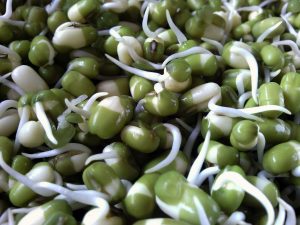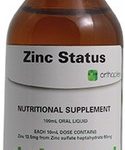 Are you feeling tired, low mood, loss of appetite, indigestion, and catch a cold easily? Chances are, your body may be low in zinc. Zinc is such a critical element in human health that even a small deficiency can have a detrimental effect. Lack of zinc can lead to a wide range of nonspecific symptoms and is commonly associated with many diseases, including skin disorders, cardiovascular disease, various forms of cancer, anxiety and depression, Parkinson’s disease, Alzheimer’s disease, diabetes, AIDS, benign prostatic hyperplasia, etc. [1] [2] Correcting zinc imbalance can often help to improve the disease outcome and symptom severity of many of these conditions. Even for common cold, current research has found that oral zinc supplementation can help to shorten the duration of symptoms. This is based on a systematic review of 17 trials with a total of 2121 participants [3]. Hence, ensuring a sufficient level of elemental zinc in the body is important to maintain good health.
Are you feeling tired, low mood, loss of appetite, indigestion, and catch a cold easily? Chances are, your body may be low in zinc. Zinc is such a critical element in human health that even a small deficiency can have a detrimental effect. Lack of zinc can lead to a wide range of nonspecific symptoms and is commonly associated with many diseases, including skin disorders, cardiovascular disease, various forms of cancer, anxiety and depression, Parkinson’s disease, Alzheimer’s disease, diabetes, AIDS, benign prostatic hyperplasia, etc. [1] [2] Correcting zinc imbalance can often help to improve the disease outcome and symptom severity of many of these conditions. Even for common cold, current research has found that oral zinc supplementation can help to shorten the duration of symptoms. This is based on a systematic review of 17 trials with a total of 2121 participants [3]. Hence, ensuring a sufficient level of elemental zinc in the body is important to maintain good health.
The biology of zinc

- Zinc is a co-factor for more than 300 enzymes in the body. Enzymes are biological proteins that act as catalysts for complex biological reactions to occur, whereas a co-factor is a substance which presence is essential for the activity of an enzyme.
- Zinc plays a role in the formation of small proteins called zinc fingers that are involved in differentiation and proliferation of cells.
- Zinc helps to regulate gene expression in cells.
Therefore, zinc is needed in within every single cell of the body. It is the second most abundant essential metal in the body after iron [1]. Unlike iron, the body does not store zinc to buffer for inadequate supply. Thus, it is important to ensure regular supply of zinc through diet [5].
Dietary sources of zinc
Dietary zinc is available from both animal and plant sources. Oysters, beef, lamb, pork, seafood, egg, and milk are common animal sources. Sundried tomatoes, fortified breakfast cereals, seeds and nuts, legumes, and whole wheat breads are plant-based sources high in zinc. Examples of plant-based sources of zinc is summarized in the following table:
[table caption=”Table 1 Plant-based foods rich in zinc (6)” colalign=”left|left”]
Plant-based foods,Zinc (mg/100g)
Sun-dried tomatoes,13.6
Zinc-fortified breakfast cereals,1.9-7.8
Pumpkin seeds,7.5
Sunflower seeds,5.8
Sesame seeds,5.5
Pine nuts/cashews,5.3-5.5
Flaxseed,4.3
Almonds/pecans/Brazil nuts,3.7-4.1
Lentils/soy beans/kidney beans ,3.0-4.0
Whole wheat biscuit breakfast cereal,2.0-2.7
Toasted mixed grain bread roll,2.0
[/table]

The estimated average requirement (EAR) for zinc is 12mg for an adult male (age 19+) and 6.5mg for adult female (age 19+). The recommended dietary intake (RDI) for zinc is 14mg for male and 8mg for female [6]. Such amount can be easily obtained from foods as long as one is eating a healthy and balanced diet.
Vegetarian and zinc

Vegetarians are advised to take more zinc foods than non-vegetarians. In fact, the RDI for zinc for vegetarians are 50% more than that of non-vegetarians (21mg for male, and 12mg for female). This is because the bioavailability of zinc is lower in plant-based sources due to the presence of phytate. Phytate inhibits the absorption of zinc by chelating with zinc to form an insoluble complex that cannot be absorbed by the digestive system. Phytate is commonly found in legumes, unrefined cereals, seeds, and nuts [6]. For this reason, research has found that dietary zinc intakes and serum zinc concentrations are significantly lower among vegetarians compared to non-vegetarians [7]. Nonetheless, food processing methods, including milling, soaking, sprouting, fermenting, and heating can enhance the bioavailability of zinc, destroying over 50% of the phytate in plant-based foods. Furthermore, vegetarians appear to be able to adapt to lower dietary zinc intake by increasing the efficiency of zinc absorption to maintain a stable zinc status. As such, well-planned vegetarian diets can provide adequate zinc for all age groups and vegetarians are at no greater risk of zinc deficiency than non-vegetarians [6].
Seven ways to increase the intake and bioavailability of zinc in plant-based diet:

- Eat more sun-dried tomatoes
- Replace refined carbohydrates (white rice and white bread) with unrefined complex carbohydrates (brown rice, wholemeal brain, buckwheat, rye, multigrain, etc.)
- Soak beans overnight and remove the water before cooking
- Sprout beans and grains before cooking
- Incorporate fermented grains (e.g. red yeast rice, fermented rice) and beans (e.g. tempeh) products in diet.
- Eat a handful of roasted pumpkin seeds, sunflower seeds, almonds, walnuts, pecans, etc. as snacks daily
- Select zinc-fortified whole grain breakfast cereals instead of regular cereal.
Causes of zinc deficiency
Zinc deficiency is a major public health issue in many developing countries due to poor diet. An estimated 17.3% of the world’s population is at risk of inadequate zinc intake which can lead to growth retardation (stunting) and recurrent infections among children [8] [9]. With a better supply of food sources of zinc, severe deficiency of zinc among population in developed nations is not common; however, there are still many who suffers from subclinical and mild to moderate deficiencies, especially among alcoholics, elderly individuals, patients with chronic illnesses, and women during pregnancy and lactation. Many of them simply unaware of their deficiency.

The resulting poor zinc status is due to one or more reasons including poor diet, poor digestion that leads to impaired absorption, increased demand by the body due to diseases or pregnancy, or increased excretion by the kidney [4]. In fact, any form of stress, trauma, inflammation, or use of steroid can all lead to the decrease of zinc status in the body [10]. Lowering of zinc status has been shown to weaken the immune system, increase oxidative stress, and promote inflammation within the body. Such oxidative inflammatory process is part of the complex mechanism of biological aging [2]. In other words, lack of zinc can cause the body to rapidly age.
Assessing zinc status
Zinc concentration in blood is the best available biomarker for assessing zinc status in the body, even though only 0.1% of the body’s zinc is found in the blood. The zinc concentration in the blood also fluctuates widely (as much as 20%) during the day depending on food ingestion. Blood test for zinc after overnight fasting is commonly used as the value for zinc status assessment, and this value represents the highest zinc concentration in blood during the day [8]. Other biomarkers for zinc status are urinary zinc concentration and hair zinc concentration [5]. All these biomarkers require laboratory assessment with collected sample.

In naturopathic clinic assessment, a simple and instant method called Zinc Taste Test (ZTT) is used to assess a patient’s zinc status without the use of laboratory equipment. ZTT is based on the fact that an early symptom of zinc deficiency is the diminishing of the taste acuity. Higher taste sensitivity is found to be associated with higher zinc concentration in blood [11]. In ZTT, patients hold 5–10mL of a 0.1% zinc sulphate septahydrate solution (ZnSO4 · 7H2O) in their mouth, swallow it, and then describe the taste after 10 seconds. A scoring of 1 – 4 is assigned depending on how fast the patients can respond with tasting the solution, with a score of 1 and 2 indicate zinc deficiency [12]. Even though the accuracy of the ZTT has been questioned since there are various other influences on taste perception that can affect the validity of ZTT [12], it remains a simple and popular method that can be used to quickly gauge the zinc status of a patient in clinic. An improved version of the ZTT based on a visual analogue scale of taste intensity is now being proposed as a new benchmark for assessing zinc status based on taste acuity [13].
Zinc supplementation

Short term zinc supplementation can benefit those who are detected to be low in zinc status. Typical dosage of zinc supplementation of 50mg/day or below can help to quickly restore the zinc statue with many health benefits observed after supplementation. Overdose with zinc for over 100mg/day is not advisable since it can depress the immune system. Doses greater than 150mg can interfere with copper metabolism and can cause long term damage to the body [4]. As such, long-term supplementation with highly bioavailable forms of zinc should not be done without supervision by health professionals [14]. It is important to consult a qualified health practitioner before starting to take any zinc supplement.
Summary
Zinc is a very important trace element that is needed for healthy functioning of the whole body. Lack of zinc can weaken the immune system and cause rapid aging of the body. It can lead to many chronic degenerative diseases and even cancers. Eating a healthy and balanced diet is important to ensure sufficient intake of zinc from foods, especially for vegetarians. Although the bioavailability of zinc is lower in plant-based sources due to the inhibiting effect of phytate, there are many ways to improve absorption of zinc. Therefore, vegetarians are at no greater risk of zinc deficiency than non-vegetarians.
Although severe zinc deficiency is rare among the population in developed economies, there are still many who suffer from mild to moderate level of zinc deficiency, especially among the elderly. Poor diet, poor digestion, alcoholism, stress, trauma, medication, and chronic illnesses are all potential causes of zinc deficiency. There are several tests for zinc status utilizing the blood, urine, hair, as well as taste. Correcting the zinc deficiency through supplementation can help to improve overall health for many of these patients. Nonetheless, zinc supplementation must be taken with care and not to overdose and use for long-term. It is important to consult a qualified health practitioner before starting on any zinc supplementation.

References
[1] C.T. Chasapis, C.A. Spiliopoulou, A.C. Loutsidou, M.E. Stefanidou, Zinc and human health: An update, Arch. Toxicol. 86 (2012) 521–534. doi:10.1007/s00204-011-0775-1.
[2] Á.J.R. Cabrera, Zinc, aging, and immunosenescence: an overview., Pathobiol. Aging Age Relat. Dis. 5 (2015) 25592. doi:10.3402/pba.v5.25592.
[3] M. Science, J. Johnstone, D.E. Roth, G. Guyatt, M. Loeb, Zinc for the treatment of the common cold: a systematic review and meta-analysis of randomized controlled trials., CMAJ. 184 (2012) E551–61. doi:10.1503/cmaj.111990.
[4] H. Osiecki, The Nutrient Bible, 9th Ed., BioConcepts Publishing, Eagle Farm, OLD, Australia, 2014.
[5] N.M. Lowe, K. Fekete, T. Decsi, Methods of assessment of zinc status in humans: a systematic review, Am. J. Clin. Nutr. 89 (2009) 2040S–2051S. doi:10.3945/ajcn.2009.27230G.
[6] S.K. Baines, Zinc and vegetarian diets, Med. J. Aust. 199 (2013) S17–S21. doi:10.5694/mjao11.11493.
[7] M. Foster, A. Chu, P. Petocz, S. Samman, Effect of vegetarian diets on zinc status: A systematic review and meta-analysis of studies in humans, J. Sci. Food Agric. 93 (2013) 2362–2371. doi:10.1002/jsfa.6179.
[8] N. Roohani, R. Hurrell, R. Kelishadi, R. Schulin, Zinc and its importance for human health: An integrative review, J Res Med Sci. 18 (2013) 144–157. doi:23914218.
[9] K.R. Wessells, K.H. Brown, Estimating the global prevalence of zinc deficiency: results based on zinc availability in national food supplies and the prevalence of stunting., PLoS One. 7 (2012) e50568. doi:10.1371/journal.pone.0050568.
[10] J.C. King, Zinc: an essential but elusive nutrient., Am. J. Clin. Nutr. 94 (2011) 679S–84S. doi:10.3945/ajcn.110.005744.
[11] B.J. Stewart-Knox, E.E. a Simpson, H. Parr, G. Rae, a Polito, F. Intorre, N. Meunier, M. Andriollo-Sanchez, J.M. O’Connor, C. Coudray, J.J. Strain, Zinc status and taste acuity in older Europeans: the ZENITH study., Eur. J. Clin. Nutr. 59 Suppl 2 (2005) S31–6. doi:10.1038/sj.ejcn.1602295.
[12] T. Gruner, R. Arthur, The Accuracy of the Zinc Taste Test Method, J. Altern. Complement. Med. 18 (2012) 541–550. doi:10.1089/acm.2011.0298.
[13] M.J. Zdilla, L.D. Starkey, J.R. Saling, A Taste-intensity Visual Analog Scale: An Improved Zinc Taste-test Protocol., Integr. Med. (Encinitas). 14 (2015) 34–8. http://www.ncbi.nlm.nih.gov/pubmed/26770137.
[14] W. Maret, H.H. Sandstead, Zinc requirements and the risks and benefits of zinc supplementation, J. Trace Elem. Med. Biol. 20 (2006) 3–18. doi:10.1016/j.jtemb.2006.01.006.